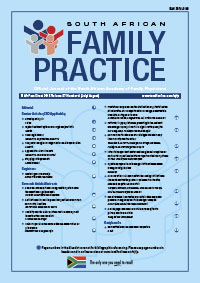An observational study on factors influencing antibiotic use in chronic obstructive pulmonary disease at Universitas Academic Hospital, Bloemfontein
Abstract
Background: Acute exacerbations of chronic obstructive pulmonary disease (AECOPD) are often precipitated by excessive airway inflammation caused by viral or bacterial infections. Current guidelines suggest prescribing antibiotics to patients with AECOPD and purulent sputum production, but this may lead to unnecessary or inappropriate antibiotic use. The aim of this study was to assess clinical and laboratory variables influencing antibiotic prescriptions of clinicians managing patients hospitalised for AECOPD. Methods: A prospective cohort analytical study was conducted among patients hospitalised with AECOPD. Antibiotic prescriptions were compared with sputum appearance, white blood cell count, C-reactive protein (CRP) levels and sputum cultures. Treatment outcomes were assessed on day 3 and 5 after admission. Results: Thirteen patients were included in the study, from July to October 2013, at Universitas Academic Hospital, Bloemfontein. Antibiotics were prescribed in 7 out of 8 patients with an elevated CRP level. None of the patients with reported sputum purulence received antibiotics. White blood cell count and sputum cultures did not seem to influence antibiotic prescriptions habits. Conclusions: Clinicians managing patients with AECOPD seem to base antibiotic prescription decisions on CRP levels rather than the patient's reported sputum purulence. This may be a useful strategy to limit inappropriate antibiotic use in patients with COPD. (Full text available online at www.medpharm.tandfonline.com/ojfp) S Afr Fam Pract 2015; DOI: 10.1080/20786190.2015.1047144
Published
2015-08-26
Section
Research Articles
By submitting manuscripts to SAFP, authors of original articles are assigning copyright to the South African Academy of Family Physicians. Copyright of review articles are assigned to the Publisher, Medpharm Publications (Pty) Ltd, unless otherwise specified. Authors may use their own work after publication without written permission, provided they acknowledge the original source. Individuals and academic institutions may freely copy and distribute articles published in SAFP for educational and research purposes without obtaining permission.

